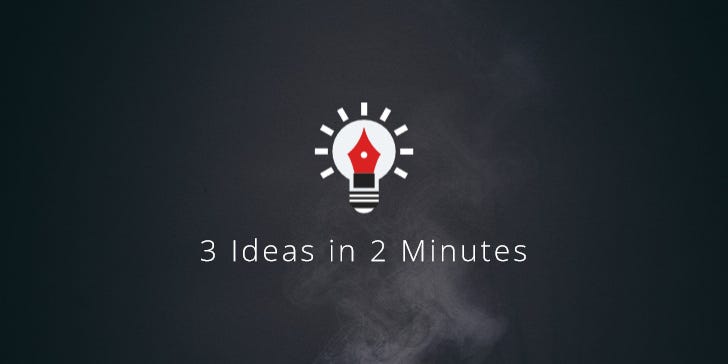#225: Gretchen Question, Three Lives Theory & Congruence
3 Ideas in 2 Minutes on Building Trust
I. Gretchen Question
Now tell me, how do you feel about religion?
Gretchen senses that something is wrong with her love interest, Dr Faust. The tension is palpable until she eventually asks him the above question. It marks a pivotal moment in Johann Wolfgang von Goethe’s tragedy Faust.
A Gretchen Question (German: Gretchenfrage) is a question that becomes deeply revealing, as it cuts to the core of a matter and forces people to show their inner convictions and true beliefs.
Gretchen isn’t wrong. Faust made a pact with Mephisto, the devil himself, trading his soul for unlimited knowledge and pleasure. The Doctor of Theology knows perfectly well that answering truthfully would jeopardise his relationship with the devout and morally upright Gretchen.
II. Three Lives Theory
Every human being has three lives.
Says former three-letter-agency employee Andrew B. In what I call the Three Lives Theory, he distinguishes between our public, private and secret lives:
Public Life: Our public persona, how we present ourselves to people who don’t know us well. It’s not necessarily a matter of reality, but a matter of how we’re being perceived, e.g. in terms of our personality or business success.
Private Life: Here, we get into what our closest family and friends know about us. These are things we obviously don’t present in public. For example, we wouldn’t advertise our personal health issues or financial problems. That’s private.
Secret Life: These are the aspects of our lives we’re not sharing with anyone. Not even our closest family members. They’re our most private thoughts or vulnerabilities. Entering legally-binding agreements with the evil incarnate, for instance, isn’t something you’d discuss with your spouse over dinner.
The goal of “employees” such as A. Bustamante is to build trust with a source. By getting into their private life as quickly as possible and ultimately uncovering their secret life to gain leverage.
III. Congruence
How do you get from “I don’t know you” to “I want to work with you” in sales through social media? It relies on what LinkedIn coach Xhoni Mimillari calls Congruence.
In his interview on the Produced By with Tommen Podcast, Xhoni defines Congruence as staying true to your real expertise and values. Even if it means earning less in the short term. It’s about consistently aligning what you say, sell and deliver. Not chasing trends and trading your soul for a fake persona.
He tells the story of one buyer who only became a client after six years. Lots of potential customers, he says, were just lurking in the background:
You don’t even know they’re there. They are watching. Because the highest quality of clients […] are not gonna like and comment on your post. They’re just gonna watch silently, quietly and they look for congruence, look for, “Can I trust this person with my money? Can I trust this person with my time? Will this person be there for me after we conclude our work?”
👉 For more inspiration on growing an audience, check out Tomas Loucky’s Produced By with Tommen Podcast and Produced Newsletter. 🐘
Have a great week,
Chris
themindcollection.com

